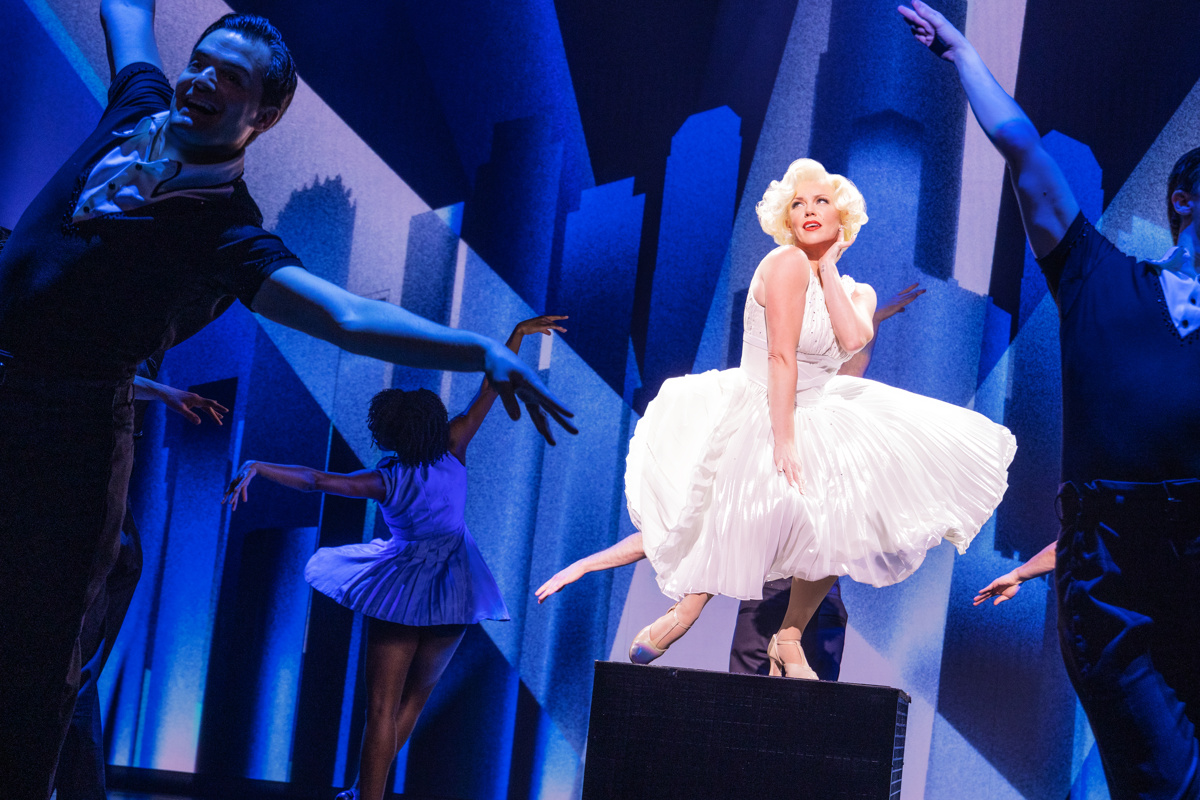NBC’s 2012 series “Smash” is the ultimate guilty pleasure. Even though it is often described as a hate-watch, the show’s phenomenal original music by “Hairspray” composer-lyricists Marc Shaiman and Scott Wittman gave “Smash” an afterlife far beyond its two-season run on network television. Songs like “Let Me Be Your Star” and “They Just Keep Moving the Line” have become bona fide classics in the theater world, covered in countless 54 Below concerts and audition rooms.
Though the TV show suffered from poor ratings and writing, its recent stage adaptation is even less successful. The musical on Broadway, directed by Susan Stroman, brings a new comedic take to the material, but ultimately struggles to transition from screen to stage.
Like the NBC series, the musical “Smash” follows the making of “Bombshell,” a Broadway musical about Marilyn Monroe’s life. But unlike its source material, which was a serious drama, the stage version is a comedy about the theater industry. One of the main characters of the TV series, Ivy Lynn (Megan Hilty), is a seasoned Broadway chorus member who finally gets her big break when she lands the role of Monroe, but struggles with drug addiction, similar to the real-life actress she’s playing. In the Broadway show, Ivy (Robyn Hurder) is a successful theater actress who has already starred in several musicals. The musical follows her as she becomes overly engrossed in method acting while playing Marilyn, leading to increasingly crazy events involving everything from horse laxatives, social media influencers and Ivy’s cartoonishly evil acting coach, Susan Proctor (Kristine Nielsen).
At first, it may seem wise for the stage production to take this comedic turn — the TV show often took itself too seriously, delivering its worst moments when they melodramatically mishandled topics like drug abuse, suicide and sexual harassment. Even with this lighter tone, the musical fails to provide a compelling story, relying too heavily on shallow humor and flat characters for gags.
While the struggles of “Bombshell’s” creative team are played for comedy, watching them suffer quickly grows old. One confounding storyline follows composer Jerry (John Behlmann) as he slowly descends into alcoholism from the stress of the production. In a failed bit of slapstick comedy, several flasks fall out of his coat. Another running joke is how Nigel (Brooks Ashmanskas), “Bombshell’s” director, repeatedly says he wants to be killed or fired so he can stop directing. Ivy’s cruelty to the cast and crew, while entertaining at first, becomes repetitive as she devolves into a stereotypical diva. The script by Rick Elice and Bob Martin is neither absurd enough to be funny, nor genuine enough to be taken seriously. When Ashmanskas and Hurder do make you laugh, it is because of their impeccable delivery and physical comedy, not because the material they are given is strong. Underneath the comedy of “Smash” are real issues in the theater industry: toxic workplace environments, the capitalistic demands of Broadway and more. But “Smash” is uninterested in exploring these issues outside of unpredictable plot twists and wacky hijinks.
Although “Smash” makes radical changes to the original plot of the show, it also restages most of its musical numbers with the expectation that they will work in this new context. The musical numbers were always the highlight of the NBC series, with choreographer Joshua Bergasse vividly capturing Shaiman and Witman’s music through dance. One of the TV series’ most iconic songs is “Let’s Be Bad,” a number from “Bombshell” depicting Monroe’s troubles on the set of “Some Like It Hot” that also reflects Ivy’s own struggles with substances. The stage version, with its revised plot, does not explore the darkness in Monroe or Ivy’s personal life and makes her seem more like a caricature. Rather than progressing the plot, it is as if the show halts its momentum just to perform the number. Bergasse, who is still the choreographer of the musical adaptation, keeps almost the same choreography seen on TV, but it lacks the same impact. Moves that looked dynamic and powerful on screen as the camera circled the actors come off as far more static on the stage. If “Smash” is willing to radically change its tone and characters, why doesn’t it modify its musical numbers too?
“Smash” cannot decide what it is: Is it a parody of the theater industry, or is it the “Smash” fans know from TV? The original content from the series and the new direction of the musical ultimately do not meld harmoniously. While Shaiman and Wittman’s music is still as delightful as ever, it does not fit into the strange new story “Smash” tries to tell.
Contact Ella Sabrina Malabanan at [email protected].
























































































































































